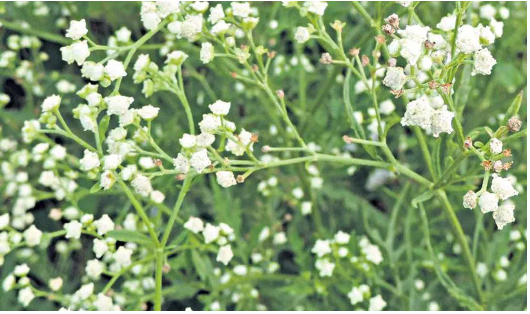Stay away from this ‘Vayyari Bhaama’ in winter

Among physicians and even agriculture scientists, it is a well-known fact that the weed is responsible for causing health problems in human beings and animals
Hyderabad: The Telugu word ‘Vayyari Bhaama’ evokes romance and inspires songs praising the heroine in movies. However, in real life, Vayyari Bhaama, which is the Telugu name for the weed Parthenium hysterophorus has a very different and rather menacing connotation.
As people brace for the months of winter, they better be prepared and do their best to avoid coming close to this Vayyari Bhaama due to its ability to release pollens and in the process trigger multiple health complications in the form of allergies.
The weeds Parthenium hysrterophurus and Lawsonia inermis (henna) are quite prevalent not only in the urban pockets of Hyderabad but even in rural parts of Telangana. And during winter, they become a menace because of their inherent ability to trigger allergic ailments.
The pollen discharged from Vayyari Bhaama even travels a distance of nearly 100 km, which makes people often struggle to pinpoint the allergen that has triggered an attack of asthma or severe lung infection.
“Winter provides ideal conditions for pollen to remain suspended in the air for a long period of time. Both Parthenium and Lawsonia are prodigious, when it comes to releasing pollen and during the winter season, they become rather effective. In fact, till a decade ago, just before the onset of winter season, there used to be a practice wherein the municipal workers used to clean-up old buildings and other areas that are naturally infested with these two weeds,” says noted allergy specialist, Dr Vyakaranam Nageshwar.
Among physicians and even agriculture scientists, it is a well-known fact that Parthenium is responsible for causing health problems in human beings and animals, besides having a deteriorating on the environment, loss of productivity and biodiversity.
The moment individuals come in contact with the pollen released by Parthenium, the body’s immune system responds leading to allergies. Immune responses during winter can be mild, from coughing and a runny nose, to a life-threatening reaction know as anaphylaxis.
“It’s better to start walking or running after 7 am, when the natural sunlight becomes abundant and reduces the impact of the pollen. Repeated exposure is not health for individuals, as it may cause antigen antibody reaction leading to various kinds of ailments,” Dr Nageshwar pointed out.
Health impact due to Vayyari Bhaama:
Skin inflammation, eczema, asthma, allergic rhinitis, hay fever, black spots, burning and blisters around the eyes, diarrhoea, choking, allergic bronchitis







